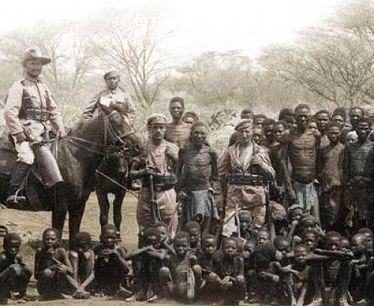The Nama-Herero War of 1880 stands as one of the most pivotal moments in the early colonial history of Namibia. It was a significant battle for the Nama and Herero peoples, who sought to resist German encroachment in the southwestern part of Africa. The conflict, which transpired in the years leading up to the German genocide in the early 20th century, was not just a military engagement but a struggle for survival, identity, and autonomy. In this article, we will explore the causes, key events, and consequences of the Nama-Herero War, as well as the lasting legacy of this significant chapter in Namibia’s history.
1. Context: The Struggle for Land and Identity
The late 19th century was a time of great change in southern Africa, driven by the European Scramble for Africa. European powers, including Britain, Germany, and Portugal, were aggressively expanding their empires across the continent. By the 1880s, the German Empire had set its sights on the region that would become German South West Africa, modern-day Namibia. This land was home to a variety of indigenous groups, notably the Herero, Nama, and San peoples, each with its own distinct culture and way of life.
The Herero were primarily cattle herders and farmers who had established strong and independent communities in the central and northern parts of what is now Namibia. The Nama, who were also pastoralists, lived in the southern and western regions of the country. These two groups, despite having distinct languages and customs, shared a deep connection to the land, culture, and resources of the region.
However, the arrival of the German settlers and the establishment of German colonial rule in the 1880s marked the beginning of a new chapter in the region’s history. The Germans began to impose their economic systems, policies, and infrastructure, disrupting the traditional way of life of the indigenous peoples. This led to a growing sense of discontent among the Herero and Nama, who increasingly found themselves fighting to preserve their land, culture, and way of life in the face of European colonialism.
2. The German Presence in South West Africa
The roots of the Nama-Herero War of 1880 can be traced to the growing German presence in the region during the late 19th century. In 1884, Germany declared the territory of German South West Africa a colony. This move was part of Germany’s broader ambitions to expand its empire across Africa. The Germans began to establish settlements, build infrastructure, and extract resources from the land, largely ignoring the existing political and social structures of the indigenous populations.
German settlers, including farmers, traders, and missionaries, began to claim large tracts of land, forcing the Herero and Nama people off their ancestral territories. The indigenous populations were also subjected to taxation, forced labor, and other oppressive measures designed to exploit their labor and resources for the benefit of the German colonial administration.
As the German settlers expanded their presence, they began to encounter resistance from the Herero and Nama, who refused to surrender their land and way of life. Tensions rose as the indigenous populations sought to defend their territories from German encroachment.
3. The Rise of Nama and Herero Resistance
In the late 1870s and early 1880s, both the Herero and Nama began to take steps to resist German colonialism. This was not the first time the indigenous groups had come into contact with Europeans, but it was the first major instance of coordinated resistance. The two groups, though distinct in language and cultural practices, recognized the common threat posed by the German settlers and began to form loose alliances.
The Herero, led by Chief Samuel Maharero, were particularly resistant to German intrusion. They were deeply committed to preserving their pastoralist way of life, which was centered around cattle herding. Cattle were not only a source of food and wealth but also a critical element of Herero identity. As the Germans took over large tracts of land, the Herero people found themselves dispossessed of their cattle and forced to abandon their traditional way of life.
Similarly, the Nama were also opposed to German colonial rule. Led by Jakob Morenga and other local leaders, the Nama fiercely resisted German encroachment in their territory. Like the Herero, the Nama were faced with the loss of their land, their livestock, and their autonomy. Both groups began to organize and resist the growing German presence.
4. The Conflict Erupts: The Nama-Herero War of 1880
By 1880, tensions between the indigenous groups and the Germans had reached a boiling point. The Nama-Herero War officially broke out as a direct result of the German settlers’ actions and the oppressive colonial policies they imposed. The German settlers were determined to expand their control over the land, and the indigenous peoples, especially the Herero and Nama, fought to preserve their autonomy and way of life.
The war itself was marked by skirmishes, ambushes, and raids carried out by both sides. The Herero and Nama employed guerrilla warfare tactics, using their knowledge of the land to launch surprise attacks on German outposts and settlements. The Germans, in turn, retaliated with heavy-handed military tactics, including the use of artillery, fortifications, and reinforcements brought in from other colonies. The Germans also relied on local African auxiliaries to assist them in suppressing the rebellion, further complicating the dynamics of the conflict.
The Nama and Herero were unable to sustain a prolonged military campaign against the Germans due to a lack of resources, modern weaponry, and coordination. However, they put up a fierce resistance that caught the Germans off guard and delayed the colonization of the region for several years.
5. The Consequences of the Nama-Herero War
The Nama-Herero War of 1880 had significant consequences for both the indigenous peoples of Namibia and the German colonialists. While the indigenous groups ultimately did not succeed in repelling the Germans, the war represented an early and intense phase of resistance to colonialism in Namibia.
For the Herero and Nama peoples, the war marked the beginning of a long struggle to maintain their cultural identity and survival in the face of overwhelming colonial power. Despite their initial resistance, both groups were eventually forced into submission, with large portions of their populations losing their land, their livestock, and their freedom.
In the years following the war, the German Empire imposed even harsher policies on the indigenous populations. These policies included further land confiscations, forced labor, and the imposition of German laws and taxes. The loss of cattle, which had been central to the Herero and Nama way of life, was particularly devastating. The economic and cultural destruction wrought by the Germans during and after the conflict weakened the indigenous populations and paved the way for the German genocide of the Herero and Nama peoples in the early 20th century.
6. Legacy and Reflection: Nama-Herero Resistance and Memory
Although the Nama-Herero War of 1880 was ultimately a failed resistance movement, its legacy continues to resonate in Namibia today. The bravery and determination shown by the Herero and Nama during the war helped lay the foundation for future resistance efforts, particularly in the early 20th century when the Herero and Nama Genocide took place. The war also set the stage for the broader struggles for independence and self-determination that would characterize Namibia’s history throughout the 20th century.
Today, the Nama-Herero War and the broader history of German colonialism in Namibia remain integral parts of the country’s cultural and historical identity. The descendants of those who resisted German rule continue to honor their ancestors through various forms of remembrance and commemoration. Memorials and ceremonies are held to remember the lives lost in the struggle for survival and identity.
Moreover, the war’s legacy has contributed to ongoing debates about reparations for the Herero and Nama genocide, as well as the acknowledgment of the injustices committed during German colonial rule. The Namibian government and civil society groups continue to push for recognition, justice, and reparations for the atrocities committed during this period of colonial violence.
The Nama-Herero War of 1880 was not just a battle between indigenous groups and European settlers—it was a struggle for survival and identity. The war marked the beginning of an ongoing fight for autonomy and dignity in the face of colonial oppression. Although the Herero and Nama could not prevent the eventual colonization of Namibia by the Germans, their resistance set the stage for future generations to continue the fight for justice, freedom, and recognition.
Today, the history of the Nama-Herero War serves as a powerful reminder of the resilience of the indigenous peoples of Namibia and their enduring struggle to reclaim their history, land, and culture. As Namibia continues to reckon with its colonial past, the legacy of the Nama-Herero War remains an essential part of the nation’s journey toward healing, reconciliation, and justice.
Join 'Namibia Today' WhatsApp Channel
Get the breaking news in Namibia — direct to your WhatsApp.
CLICK HERE TO JOIN












